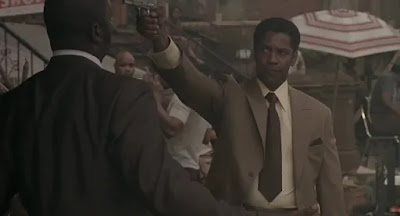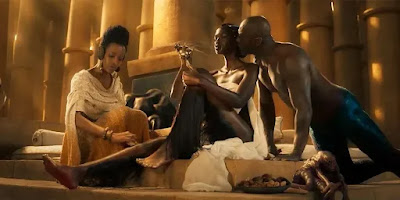Upping Aaron's Ante
or
"Do You Know Who Circe is?"
Aaron Sorkin is one of the better writers in Hollywood and he's had a good number of directors shepherding his screenplays—Rob Reiner, Thomas Schlamme (on "Sports Night" "The West Wing" and "Studio 60 on the Sunset Strip"), Mike Nichols, David Fincher, Bennett Miller, and Danny Boyle, an impressive roster—But, with his latest screenplay, Molly's Game, he has decided to take the helm himself.
The results are impressive—very—especially for someone making their first movie behind the camera. He's had some excellent teachers along the way, but their trademarks do not show up in the camera work of Molly's Game, nor does any effort to "show off" behind the camera. Sorkin, quite rightly, is in service to the story, letting it and his actors shine, while he does the necessary prop work and keeps the pace, filling in gaps, and allowing moments to breathe and sink in. At times, his directors have clashed with the material, but Sorkin knows every beat, rhythm and nuance, and, as opposed to say, David Mamet's direction of his own work, it is a perfect match of source and interpretation.
We are introduced to Molly (Jessica Chastain in another remarkable performance that she carries with an outward calm that looks like it could shatter at any moment) with a preamble: "A survey of three hundred individuals asked "what's the worst thing that can happen in sports?" She foes over a list of things—losing in the seventh game, being swept in four, as well as "losing to Argentina"...in anything—but she lands on "Coming in fourth in the Olympics." She then talks about her own experience in fourth place to make the Olympic ski team...if she can just "nail" this one freestyle run, which turns into a disaster that does severe damage to her spine, which had already had surgery done for early onset scoliosis. But, despite the injury, she walked off the ski run, defeated, and probably never to ski again. "Whoever said the worst thing that can happen is fourth in the Olympics? SERIOUSLY. Fuck You!"

Cut to years later. She is on a promotional tour for her book "Molly's Game" which details her years hosting high stakes poker games in Los Angeles and New York when she receives an early morning phone call. It's from the FBI, who are right outside her door and about to arrest her. She gives up without a fight and takes a look at the indictment for running an illegal gambling organization—"United States of America v. Molly Bloom." "I'd lay odds on the favorite." she mutters.
 |
| Molly hides the headlines so her potential lawyer's daughter won't see it. |
That first sequence is a stunner. A carefully intricate assemblage of anticipatory shots before Molly's big run that ends with a disastrous accident where the million to one odds of what went into the making of it are laid out so that both the chances and the impact of it are made clear to the audience. It's a combination of Molly's special circumstances and just bad luck that contribute to it. It is an editor's nightmare, but a storyteller's dream and both jobs come off smoothly and successfully. A lot of what Sorkin brings to the mix is how to tell us a story and anticipating the "needs-to-know" and placing them where they make the most impact. The viewer becomes part of the storytelling process. It is a strategy—and a talent—that will be utilized in great abundance throughout the entire picture.

Molly is having trouble landing a lawyer—it's a little tough when you've written a book admitting to the crime that you're being charged with. But, Charlie Jaffey (Idris Elba—finally, finally, in a part that shows how good the man is) of the law firm of Gage Whitney (Hey! That's Sam Seaborn's law firm!) has an interest in the case. He's been reading Molly's book and finds it more interesting for what she doesn't say than what she does. He's non-committal; he's not sure he wants to be her lawyer—she's said too much in public, she's too high-profile, and there's the more-than-likely suspicion that the prosecution is just using her to crack some bad sorts in Russian organized crime and other high-rollers in international crime sects. No way. No how.
Bloom's first court appearance—Jaffey has arranged bodyguards for her protection,
and hasn't decided to take the case, but, to advise her, he keeps switching with the bodyguards.
That's Graham Greene—"Kicking Bird" from Dances with Wolves—as the judge.
Now...this is "based on a true story" (the title card that makes me the most suspicious these days) and in the End Credits says it's based on Bloom's book, but the main story-line takes place AFTER the book has been written and published. Sorkin is furrowing new ground here, but also reading between lines of that book and doing his due diligence—he goes way back into Molly's background with little nuggets—like that her father, a psychology professor (played by Kevin Costner—never better) would video-tape his kids in an ongoing questionnaire while they were growing up (Geez, MOST parents just use a ruler and a pencil-mark on the wall) that he uses to great advantage—it may not seem important at the time you first see it, but out of sight/out of mind...and when you come back to it, it's devastating.

It's the book scenes that most people will be preoccupied with and those are outlined as past discussions to fill in Charlie and give a taste of what that high-stakes life style was like. It doesn't matter what anyone is wearing and who's who (Michael Cera plays"Player X" a celebrity named in the book as Tobey Maguire, who basically is in it to destroy people) as Molly enters this world as a personal assistant for a propped-up financier (Jeremy Strong) who runs a weekly game at "The Cobra Club" (The Viper Room) for a select few. She treats the poker game as she does any job and gradually learns enough that she finds a way to better it, stealing away the financier's players in a hostile takeover engineered by "X".

But, poker is not a game of luck. It's a game of skill. And as Molly's fortunes rise and fall and balloon on the East Coast, she starts to compromise, succumbing to her own gambler's greed and a bit of hubris, even inheriting a bit of Player X's "take-no-prisoners" gambiting. All the while in "Real-Time" land, the stakes of her case are becoming more and more dire.

Doesn't seem like much, does it? But Sorkin makes it fascinating and he has thoroughbreds pulling off the artifice while he keeps all his dishes spinning on sticks, never keeping the audience out of the game by—sparingly—going into quick poker tutorials whenever something gets a bit technical, or runs a danger of seeming inconsequential. You always learn something from a Sorkin script (for instance, that scientists have concluded the center of the galaxy smells like rum and raspberries...the movie says "strawberries," but, hey, Hollywood....). But for all the ruthlessness and cold-heartedness displayed in the thick of a green felt battleground, the film has a soft spot. In fact, I dare you to get through Costner's "three years of therapy" scene with Chastain ("See what you can do when you're not charging by the hour?") without at least throat-lumpage occurring.

No, it doesn't seem like much. However, if the film was released at any other time, poised at any other cusp of our social fabric evolving, Molly's Game would still resonate—maybe not as much as Spielberg's upcoming The Post does in terms of the role of the press and big "T" Truth—with the issue of the base dynamics of power—between men and women, between bosses and subordinates, between government entities and those of us caught between the gears of them—of the high-stakes games of bluff and threats that make up the dark matter of our everyday Universe. And the Evil that can be done in the atmosphere of it. Molly's Game hits it. And hits it hard.
Now, it may be too early to say that Molly's Game is the movie of the year—there's a lot of good things that haven't even opened in my area yet—but, so far, it's one of my favorites if not THE favorite, and I'd lay serious odds on it.

 "That's What's Wrong with America. You can't Find the Heart of Anything to Stick the Knife In"
"That's What's Wrong with America. You can't Find the Heart of Anything to Stick the Knife In"






















































